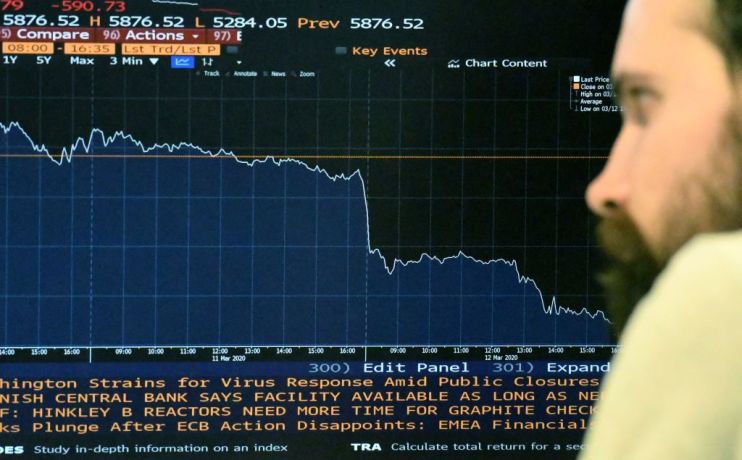FTSE 100 extends losses after worst daily drop in a month

The FTSE 100 extended its losses today after suffering its worst daily drop in a month yesterday as dire economic reports and weak earnings weighed on traders.
London’s blue-chip index was down roughly 2.3 per cent at 5,762 points by around 10.20am today.
By the mid-afternoon the FTSE 100 had trimmed its drop to just under two per cent. It had lost 115 opoints to hit 5,786 by 3.05pm.
That followed the index enduring what analysts dubbed a “terrible” session yesterday. It dropped 3.5 per cent yesterday as Shell’s share price sank on dire results.
Trump’s China tariff threats dent FTSE 100
Today dire UK manufacturing figures showing record plunges in April knocked the FTSE 100. But the biggest driver was US President Donald Trump’s threat of fresh tariffs against China over coronavirus.
Trump has warned he will level new tariffs on the superpower in retaliation for allegedly covering up the full extent of its coronavirus outbreak. Recently China admitted Wuhan – the epicentre of the outbreak – experienced 1,000 more deaths than reported.
That could halt progress made before coronavirus struck on a US-China trade deal, analysts said.
“That has rattled traders,” David Madden, chief analyst at CMC Markets, said.
“Phase one of the US-China trade deal was signed in January, after much toing and froing, to say the least.
“It is possible we could be in for another prolonged period of tough tariff talk. Some people might think this is just a ploy by Mr Trump to make himself look good ahead of the Presidential election, but either way it has prompted traders to trim their exposure to stocks.”
“Trade tensions back on the agenda won’t be terribly positive for risk appetite but for now remains something on the margins,” Neil Wilson, chief analyst at Markets.com, added.
The index’s drop today means it has risen then fallen 400 points this week back to below 5,800.
“This will be a level bulls will seek to defend,” Neil Wilson, chief market analyst at Markets.com, said.
Factories suffer dire April in lockdown
UK manufacturing data also weighed down the FTSE 100. Figures today showed the coronavirus lockdown has had an awful impact on British factories.
New orders, output and employment all posted record falls on IHS Markit’s survey. And economists warned the lack of a backlog for manufacturers is also a concern.
“The April headline PMI understated the weakness of the manufacturing sector,” Howard Archer, chief economic adviser to the EY Item Club, said.
“This is because there was once again a marked positive contribution to the PMI from a record lengthening of supplier delivery times. This is normally seen as reflecting strong demand and a positive. But it has recently been due to the disruption to supply chains stemming from… factory shutdowns around the world and shipping delays due to coronavirus.”
FTSE 100: A tale of two banks
UK bank RBS, meanwhile, jumped three per cent despite profit halving on coronavirus. Traders were pleased the taxpayer-owned lender managed to stay in profit despite the outbreak.
Lloyds, however, sunk 4.4 per cent to 30.8p after revealing a 95 per cent plunge in first quarter profit yesterday. Revenues also slumped deeper than those of RBS.
“RBS said profits fell 59 per cent to £288m as it set aside £800m for loan losses,” Wilson said. “But revenues were down just 1.6 per cent at £3.2bn – Lloyds reported an 11 per cent decline in revenues. Something doesn’t look right.”
Signs of recovery for the FTSE 100 came to an abrupt end yesterday as the index ended April on a slump.
The European Central Bank decided to leave interest rates and its bond-buying programme on hold yesterday.
Awful economic data showing the Eurozone shrank at its fastest rate on record in the first quarter compounded the problem.
Blue-chip stocks were also dragged down by Shell’s dividend cut — its first since the Second World War — and a plunge in profit at Lloyds.
European stocks spared another day of falls
European stocks will see some relief today however, with markets closed for national holidays.
Germany’s Dax and the French Cac 40 benchmark both closed down more than two per cent yesterday.
US markets yesterday also suffered falls, with the Dow Jones, S&P 500 and Nasdaq all closing in the red.
However, the major indices still secured their best month in three decades in April.
US stocks drop for second day runnig
US stocks followed the FTSE 100 further down as Wall Street opened this afternoon. The Nasdaq, S&P 500 and Dow Jones all dropped just shy of two per cent after dire US manufacturing data.
US factories matched the UK’s earlier plunge. They sank at the fastest pace recorded in data gatherer IHS Markit’s 28 years of surveys.
Output posted a record drop for April. And new orders, employment and inventories fell at their steepest rates since the financial crisis.
“There is little shock value in today’s numbers,” Binay Chandgothia, a portfolio manager at Principal Global Investors, said. “The markets have already moved beyond [economic data] to focusing on the duration of it.
“The markets would like to see continued progress – moving from a stabilisation phase to a recovery phase.”
Chris Williamson, chief business economist at IHS Markit, warned a slow recovery will hurt manufacturers’ hopes of bouncing back.
“As restrictions are lifted, demand should gradually revive. But the trade-off between risking a second wave of infections and bringing the economy back to life looks set to be one of the greatest challenges,” he said. “The process will inevitably be led by caution, meaning recovery will also be frustratingly slow.”
Meanwhile, Nasdaq-listed Amazon dropped five per cent inside an hour of trading after missing profit estimates despite beating revenue predictions.